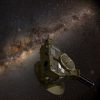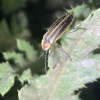Daniel Strain
 Over billions of years, the universe's stars and galaxies have left behind an imperceptibly faint light in space. NASA's New Horizons spacecraft has traveled to the edge of Earth's solar system and captured the most accurate measurement of this glow to date.
Over billions of years, the universe's stars and galaxies have left behind an imperceptibly faint light in space. NASA's New Horizons spacecraft has traveled to the edge of Earth's solar system and captured the most accurate measurement of this glow to date. In an election year, experts from CU Boulder weigh in on strategies you can take to distinguish real and fake images online—and how to talk to friends and family spreading misinformation.
In an election year, experts from CU Boulder weigh in on strategies you can take to distinguish real and fake images online—and how to talk to friends and family spreading misinformation. Decades after his voyage on the HMS Beagle, Charles Darwin became fascinated by why plants move as they grow—spinning and twisting into corkscrews. Now, more than 150 years later, a new study may have solved the riddle.
Decades after his voyage on the HMS Beagle, Charles Darwin became fascinated by why plants move as they grow—spinning and twisting into corkscrews. Now, more than 150 years later, a new study may have solved the riddle. This month, children across the U.S. are heading back to class. Their educations will be shaped by the decisions of nearly 13,000 school boards. Anna Deese, a former school board member from Montana, breaks down some of the biggest misconceptions.
This month, children across the U.S. are heading back to class. Their educations will be shaped by the decisions of nearly 13,000 school boards. Anna Deese, a former school board member from Montana, breaks down some of the biggest misconceptions. In a new study, researchers created a sort of simulated voting booth—a space where people, or mathematical “agents,” with various biases could deliberate over decisions. The results may help reveal the mathematics of how the human brain acts when it needs to make a choice.
In a new study, researchers created a sort of simulated voting booth—a space where people, or mathematical “agents,” with various biases could deliberate over decisions. The results may help reveal the mathematics of how the human brain acts when it needs to make a choice. A growing number of AI technologies analyze the way people talk to screen for mental health conditions like depression or anxiety. A new study finds that they may not perform consistently across people from different demographic groups.
A growing number of AI technologies analyze the way people talk to screen for mental health conditions like depression or anxiety. A new study finds that they may not perform consistently across people from different demographic groups. Since announcing her bid to run for president on July 21, Vice President Kamala Harris has generated praise and drawn questions about her electability—including from some media outlets and online commentators who have asked: “Is the United States ready to elect a multiracial woman?”
Since announcing her bid to run for president on July 21, Vice President Kamala Harris has generated praise and drawn questions about her electability—including from some media outlets and online commentators who have asked: “Is the United States ready to elect a multiracial woman?” A coalition of educators from 10 states and led by CU Boulder has released a new series of free science curricula for high school students—touching on issues critical to the lives of young people, from wildfires to rising sea levels and cancer biology.
A coalition of educators from 10 states and led by CU Boulder has released a new series of free science curricula for high school students—touching on issues critical to the lives of young people, from wildfires to rising sea levels and cancer biology. CU Boulder graduate student Owen Martin grew up in Colorado but had never seen a firefly in the state until three years ago. Now, he and his advisor Orit Peleg are trying to raise awareness of the Rocky Mountain region's glowing and "wonderous" insects.
CU Boulder graduate student Owen Martin grew up in Colorado but had never seen a firefly in the state until three years ago. Now, he and his advisor Orit Peleg are trying to raise awareness of the Rocky Mountain region's glowing and "wonderous" insects. In a new rom-com, Scarlett Johansson plays a PR maven hired to film a fake version of the moon landing. Media scholar Rick Stevens gives his take on why conspiracy theories around the moon landing have such staying power.
In a new rom-com, Scarlett Johansson plays a PR maven hired to film a fake version of the moon landing. Media scholar Rick Stevens gives his take on why conspiracy theories around the moon landing have such staying power.


